 To honor the life and legacy of the late president of the American Federation of Teachers, the nonprofit Albert Shanker Institute was established in 1998.
To honor the life and legacy of the late president of the American Federation of Teachers, the nonprofit Albert Shanker Institute was established in 1998.
The organization’s by-laws commit it to four fundamental principles—vibrant democracy, quality public education, a voice for working people in decisions affecting their jobs and their lives, and free and open debate about all of these issues.
Committed to basic principles, open to new ideas, and addressing the inter-related issues of work, education, and democracy—that is the vision, the mission, and the method of the Albert Shanker Institute.
In honor of the 25th anniversary of the Shanker Institute's founding, we published highlights of Institute's achievements.
1999
Support for "The Teaching Gap: Best Ideas from the World's Teachers for Improving Education"
The Institute provided a grant to support this important book by James Stigler and James Hiebert, which compares the U.S. school system's failure to support a culture of professional development for teachers with what's working in Japan, where teachers spend time working together.
1999
Hart Research Poll of Teachers and Principals
Despite the greater demands being made on their schools, two Albert Shanker Institute-supported polls find that teachers and principals strongly support efforts to hold students to rigorous academic standards and see standards-based reform resulting in beneficial changes at their schools.
2000
Professional Workers, Unions, and Associations: Affinities and Antipathies
This paper prepared for ASI by Richard Hurd, director of labor studies at Cornell University, explores the changing nature of professional work, the attitudes of professionals toward work and unionization, and analyzes the possibility of convergence between the roles and operations of unions and professional associations.
2000
Building a New Structure for School Leadership
In this major research analysis, Richard Elmore explores the problems with the structure and leadership of public education, urging educators to study the schools whose leaders and best practice are succeeding, including through the use of collaboration and distributed leadership.
2001
French Early Care and Education Study Tour
The Shanker Institute organized a trip to learn about France's Early Care and Education System so participants could get an intensive look at the French preschool system, which has gained international attention for being universal and of high quality.
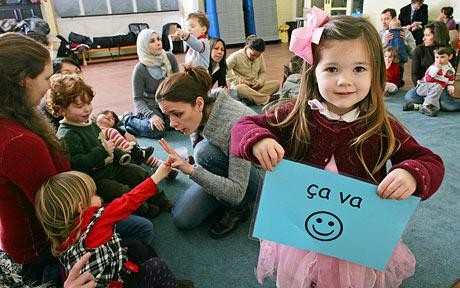
2001
Seminars on Workforce Development
Two discussions hosted by the Albert Shanker Institute explored the convergence of the ideas that 1) corporations would be better off if they concentrated on identifying and developing the talents of their current workforce, and 2) unions have a vested interest in helping members increase both the value and the quality of their work.
2002
Bridging the Gap Between Standards and Achievement
In this publication, published by the Albert Shanker Institute in conjunction with a forum for state leaders cosponsored with Achieve, Inc., Harvard professor Richard Elmore argues that education reforms that are based on standards and accountability will fail unless policymakers also adopt a strategy to ensure that educators have the knowledge and skill they need to help students succeed.
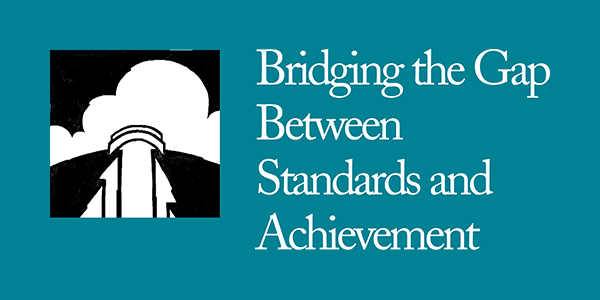
2002
Support for a History Research Paper Study
The Albert Shanker Institute provided support for a study of the state of the history research paper in United States high schools which was conducted by the Center for Survey Research and Analysis at the University of Connecticut and published in the Concord Review.
2002
Best Research to What Works Luncheon Series
This series of luncheon forums highlighted best research on key educational issues, then linked these findings to the practical steps to improve student achievement. The topics in 2002 were 1) Early Language & Literacy Development and 2) Strategies to Improve Student Behavior and Support Student Achievement.
2003
Educating Democracy: State Standards to Ensure a Civic Core
This 2003 study, authored by the late historian Paul Gagnon, evaluates the extent to which state history, civics, and social studies standards across the nation serve to help teachers in their efforts to prepare an informed citizenry.
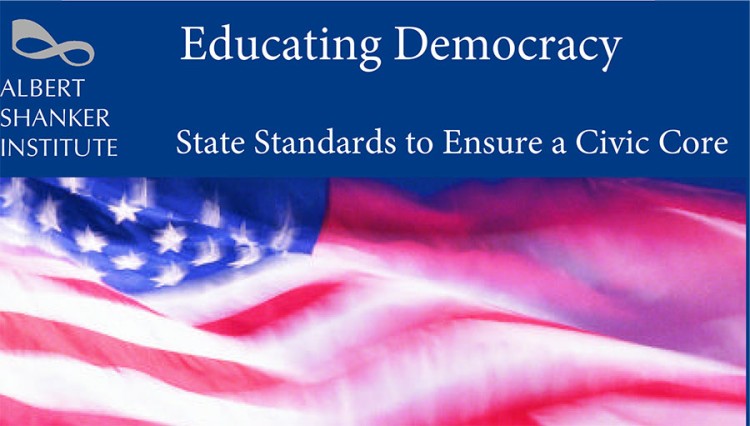
2003
Education for Democracy
Education for Democracy, a signatory statement released by the institute in conjunction with the second anniversary of September 11, 2001 and the 40th anniversary of the 1963 March on Washington, called for improvement in the teaching of democracy.
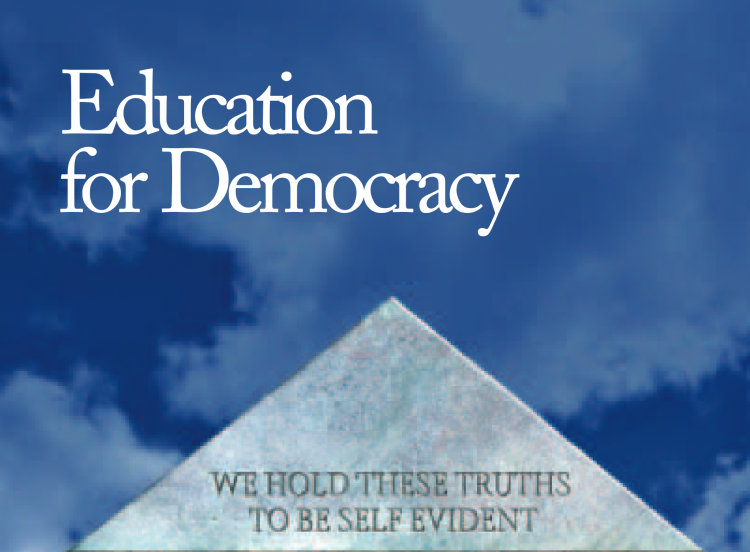
2003
Bayard Rustin Film Premiere
The Institute jointly hosted the Washington premiere of "Brother Outsider: The Life of Bayard Rustin" at the National Press Club, with the AFL-CIO, the A. Philip Randolph Institute, Freedom House, the Rustin Fund, the International Rescue Committee, the National Gay and Lesbian Task Force, Social Democrats, U.S.A., AFT President Sandra Feldman, and U.S. Representatives John Lewis and Eleanor Holmes Norton.
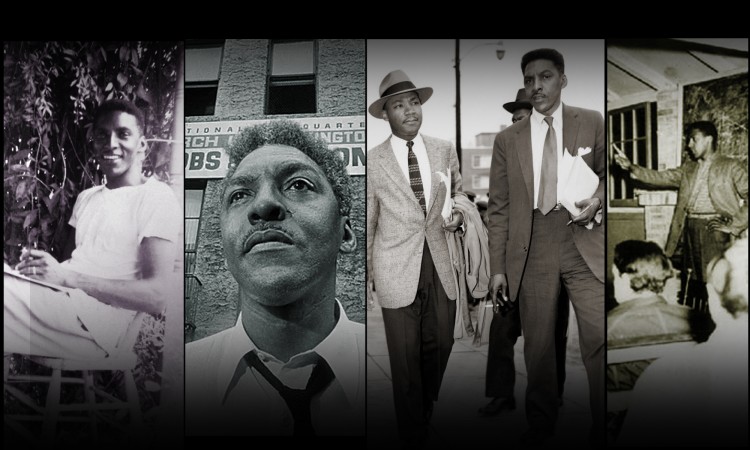
2003
Unions and Workforce Development Discussion
This discussion on the revitalization of the labor movement with John Monks, general secretary of Britain's Trades Union Congress (TUC), was co-sponsored by the Albert Shanker Institute and the New Economy Information Service. The audience, included AFL-CIO President John Sweeney and a score of other union leaders and labor academics.
2003
Seminar on Education to Build Democracy
The Albert Shanker Institute hosted a forum on international civic education with academics, leaders from the AFT, the U.S. State Dept., USAID, the National Democratic Institute, the National Endowment for Democracy, the AFL-CIO, and private industry to discuss effective program design, content, and strategy for civic education and democracy promotion abroad.
2004
Learning Partnerships: Strengthening American Jobs in the Global Economy
In April 2004, the Task Force on Workforce Development, a group of labor, business and policy experts co-sponsored by the Albert Shanker Institute and New Economy Information Service, issued a report entitled "Learning Partnerships: Strengthening American Jobs in the Global Economy," which called for far-reaching changes in the way our country manages its work-force skills and training efforts.
2004
Early Childhood Assessments: Problems & Possibilities
This forum with leading experts discussed questions raised about the appropriateness, validity, and utility of assessments with very young children.
2005
Lane Kirkland: Champion of American Labor
The Institute provided support for this biography by Arch Puddington, which traces Kirkland’s life from modest origins to his rise to the top position in the trade union movement as well as his efforts to expand labor’s political influence, his success in affiliating large independent unions to the AFL-CIO, his response to the challenges of deindustrialization and globalization, and his central role in mobilizing international labor support for Poland’s Solidarity union and in the creation of the modern democracy movement.
2005
Unionism and Democracy: The Experience, the Legacy, The Future
The Institute received a grant from the ILGWU Heritage Fund in to help sponsor this three-day seminar aimed at educating new AFT leaders on the rationale and history behind labor’s support for democracy and worker rights in the world.
2005
Reading Disabilities, Reading Difficulties & School-Based Interventions that Work
Two experts, Sally Shaywitz, Professor of Pediatrics and Child Study at the Yale University School of Medicine, and Co-director of the Yale Center for the Study of Learning and Attention and Joseph Torgesen, Professor of Psychology at Florida State University, and Director of the Center for the Study of Reading and Reading Disabilities discussed programs to improve beginning reading instruction, including strategies to identify struggling readers as early as possible.
2005
Improving the Teaching and Learning of Mathematics
The Shanker Institute held a forum with James Hiebert, the Robert J. Barkley Professor of Education at the University of Delaware and Deborah Loewenberg Ball, the William H. Payne Collegiate, Professor of Education and Director of Teacher Education at the University of Michigan who provided an overview on recent research about what mathematics teachers need to know and be able to do to improve the performance of all students.
2006
Democracy and Worker Rights: A Discussion of Labor's Approach to China
The Institute sponsored a lively discussion among representatives from nine AFL-CIO and Change to Win unions on the U.S. labor movement’s differing approaches to the increasing economic dominance of an ongoing worker rights repression in mainland China.
2006
Performance-Based Pay in Public Education
The Institute sponsored a forum with Edward Lawler, the director of the Center for Effective Organizations, and distinguished professor of business at the University of Southern California Marshall School of Business and Lewis Solmon, president of the Teacher Advancement Program Foundation, and member of the Board of Trustees of the Milken Family Foundation, on programs to encourage excellent teaching by linking teachers’ pay to their performance or to the performance of their schools or students.
2007
The Challenge for Democracy in the Middle East: The Art of the Possible
The Institute sponsored a conference on the challenge of developing practical international programs to implement the traditional commitment of the labor movement to democracy and democratic institutions in the core Middle East region. It challenged participants to help conceive innovative, practical program approaches for the Middle East region.This conference was followed by a union leadership study trip to the Middle East to investigate the role of education unions and other unions in promoting democracy and peace. The delegation met with teachers and other unionists from Israel, the Palestinian Authority, Jordan, Iraq, and Yemen, as well as with country and regional representatives of the Solidarity Center, the National Democratic Institute, and U.S. Embassies.
2007
Good Schools I: Unions, Teaching Quality and Student Achievement
This is the first in a series of two-day seminars, designed to help build a network of union leaders, district superintendents, and researchers to work collaboratively on improving public education through a focus on teaching. The topics covered in this seminar included: Why Teachers and Education Need a Union Voice; The Union’s Role in Ensuring That Teaching Quality Matches Student Needs; What Does the Research Say About Teaching Quality?; Staffing for Extra Need — Hard-to-Staff Schools and Positions — Union Policies, Union Effects; Promoting and Recognizing Teacher Excellence: Pay for Performance, Mentoring and Induction, Peer Review and Intervention, Providing Quality Curriculum and Aligned Professional Development; From Where the Superintendent Sits; From Where the Local Leader Sits
2008
A Cry for Justice: The Voices of Chinese Workers
This important publication tells the stories of workers, in their own words, as they protest for a redress of greivances — usually in defiance of their employers, government authorities, the official union, and threats of violence and imprisonment. From the Oilfields of Daqing, the Ferroally workers of Liaoyang, the Heavenly King Textile workers of Xianyang, the Gold Peak Battery factory workers of Huizhou, coal miners from Wanbao, teachers from Suizhou and ex-soldiers who work in factories around the country run by the People’s Liberation Army, the accounts are all based on extraordinary first-hand interviews conducted by Han Dongfang, China ’s leading labor rights advocate and Shanker Board member, with workers across China . Han joined the demonstrations in Tiananman Square in 1989 as a leader of the Beijing Autonomous Workers Federation and was then jailed for almost two years, in his capacity as a correspondent and presenter for Radio Free Asia. The source data for this publication was compiled by China Labour Bulletin, a Hong Kong based non-governmental organization that promotes labor rights in mainland China .
2008
Labor Law Reform in China: What Are The Implications for Worker Rights? For Political Liberalization?
The Shanker Institute sponsored a seminar in Washington, D.C. focused on the implications and impact of recently enacted labor law reform in China. The purpose of the program was to bring together China experts for a real discussion on whether or not the new labor law, which took effect on January 1, 2008, will actually give workers more voice and improve their lives. The presenters and seminar participants included more than 50 trade unionists, academics, attorneys, worker rights activists, and others deeply involved in programs dealing with China . They discussed the new law in terms of the potential impact on ongoing grassroots legal advocacy for individual workers.
2008
Good School II: Developing the Teaching Corps We Need
This seminar series is part of the Institute's effort to build a network of union leaders, district superintendents, and researchers to work collaboratively on improving public education through a focus on teaching. This second Good Schools Seminar focused on the following topics: 1) Engaging Teachers in the Improvement Agenda: Context Counts with sessions on Teacher Working Conditions and Student Learning, and Teachers Need to Know What Student Curriculum They Are Expected to Teach; 2) Developing the Teaching Corps with sessions on What Does The Research Say About New Teacher Supports?, and Peer Assistance and Review: Pitfalls and Promise; and 3) Grounding Professional Development in the Work of Schools and Specific Student Learning
2008
Creating Jobs: Delivering Education and Skills; Expanding Labor’s Role
This meeting focused on three priorities: (1) the need for a seamless web of providers from high schools to community colleges and universities to unions and employers; (2) technology and how teaching is delivered; and (3) access to learning in multiple settings. The "Postmeeting Statement," which was signed by most attendees including the International Association of Machinists and the American Federation of Teachers, ultimately resulted in the AFL-CIO Executive Council issuing a resolution based on this document.
2008
Good Schools III: Teacher Pay and Staffing: What Works, What Doesn't
This third Good Schools Seminar discussed the evidence and policy on compensation and staffing policies for teachers in the U.S. There were three main parts. The first concentrated on The Context for the Improvement of Teaching: A Revisit, with sessions on “Standards, Accountability, and the Achievement Gap: Lessons From History” and “Creating A Positive School Culture: Linking School and Community Supports.” The second part looked at Research on the Use of Incentive Pay for Improving Individual and System Performance. The final part of the seminar look at Improving Teaching Quality in Hard to Staff Schools.
2009
Preschool Curriculum: What's in it for Students and Teachers
Preschool Curriculum is an accessible research synthesis of how and how much young children learn in the academic domains of oral language, literacy, mathematics, and science.
2009
Muslim Voices on Democracy: A Reader
This publication is a resource for American teachers and students on the turbulent events taking place in many Islamic countries. It highlights the speeches, articles, and ideals of pro-democracy Muslims who are intellectuals, union activists, dissidents, and journalists. The publication also features a glossary of terms and a list of resources for further study.
2009
American Labor in U.S. History Textbooks: How Labor's Story is Distorted in High School Textbooks
The study conducted by the Institute in cooperation with the American Labor Studies Center (ALSC) makes the argument that labor history is central to an accurate depiction of U.S. history and argues that a fuller, more balanced depiction of U.S. labor history is important for the proper education of our youngest citizens.
2009
Democracy Web
Democracy Web is an on-line resource for the comparative study of democracy which challenges students to think critically about the foundations of democracy, the arc of freedom in history, the development of democracy over time, and the reasons for the ebb and flow of democracy in different eras, different regions, and within different countries. It includes study questions and activities and is continuously being updated in order to reflect the world’s current events.
2009
Assisting Independent Trade Unions in Cuba
In cooperation with the Committee for Free Trade Unionism (CFTU) headed by AFL-CIO President Emeritus Tom Donahue, Freedom House, the National Endowment for Democracy and the 21st Century ILGWU Heritage Fund, the Institute sponsored a conference which examined current conditions on workers in Cuba and the prospects for change on the island nation suffering under political repression. The conference brought together a diverse and broad group of labor leaders, journalists, activists, and human rights groups.
2009
Good Schools IV / Using the American Recovery and Reinvestment Act To Advance the Good Schools Agenda
This seminar, Good Schools IV / Using the American Recovery and Reinvestment Act To Advance the Good Schools Agenda examined the ARRA and the kinds of state and local projects it might fund to improve teacher quality, develop effective curriculum, improve the achievement of low-performing students, develop useful assessments, and other reform efforts.
2009
The Financial Crisis and Worker Rights in China
In June, 2009, the Institute sponsored a two-day conference on "The Financial Crisis and Worker Rights in China: What Has The Recession Done to Prospects for True Worker Representation?"
2010
The Global State of Worker Rights: Free Labor in a Hostile World
The Shanker Institute conceived of and supported the creation by Freedom House of this first-of-its-kind report and map of labor freedom in the world, which examined the conditions of worker rights in 165 countries.
2010
Good Schools V
In 2010, the Institute convened the fifth of is Good Schools Seminars which focused on "Pushing the Teacher Evaluation Envelope: Designing the Most Valid and Reliable Systems Possible." The seminar looked at such topics as: how teacher evaluation fits in the big picture in relation to standards/ curriculum/ assessments reform and what kinds of student data should be used in teacher evaluation; and the importance Of Union/ District support For professional teaching, staff evaluation, and due process.
2010
Good Schools VI: Multiple Measures of Teacher Performance
This sixth Good Schools Seminar focused on multiple measures of teacher performance and focused on how teacher effectiveness should be evaluated using multiple measures that are fair, relevant and reliable including Measures of student progress, teaching practice, and teaching conditions.
2011
Policy Brief: The Evidence on Charter Schools and Test Scores
This policy brief provides an accessible review of the research on charter schools’ testing effects, how their varying impacts might be explained, and what this evidence suggests about the ongoing proliferation of these schools. The brief is an adaptation of a three-part series of posts on this blog (here is part one, part two and part three).
2011
Good Schools VII: Turning Around Low-Performing Schools
In 2011 the Institute held its seventh Good Schools Seminar on Turning Around Low-Performing Schools. Sessions looked at: The Research on Raising Achievement In Poorly Performing Schools; Improving Content, Teaching, and the Supports for Both; and Setting the Stage for Success.
2011
The Role of Curriculum in Early Childhood Teacher Preparation Programs
In 2011 the Institute held a workshop on "The Role of Curriculum in Early Childhood Teacher Preparation Programs" which presented an overview of research on why the early acquisition of broad content knowledge is crucial to young children’s later academic success. Examples were provided from the Institute's four research-based teacher training modules in the content domains of oral language development, early literacy, mathematics, and science.
2012
Creating a Comprehensive System for Evaluating and Supporting Effective Teaching
This publication, by Linda Darling Hammond, Charles E. Ducommun Professor of Education at Stanford University, was written at the request of and with the input of participants in the Albert Shanker Institute's Good Schools seminars. It presents a comprehensive view on how to improve teacher preparation, make entry into the profession an educational and developmental experience, how to upgrade career and professional development, and what kind of models for evaluation make sense given the quality and integrity of current methods for doing that, including value added techniques.
2012
Spending by Major Charter Management Organizations in Three States
This report presents a rigorous analysis of 2008-2010 spending among charter schools run by major CMOs in three states – New York, Texas and Ohio. It is written by Bruce Baker (Rutgers University), Ken Libby and Kathryn Wiley (University of Colorado Boulder), and published by the National Education Policy Center, with support from the Shanker Institute and the Great Lakes Center for Education Research and Practice.
2013
Good Schools VIII: Doing Assessment Right
In the wake of No Child Left Behind and with the increasing demands on educational testing, this Labor-Management seminar looked at what a useful assessment system would look like at the state and local levels and the conceptual and practical issues that must be confronted to achieve such a system.
2013
Afro-Cuban Civil Rights Activists
The Albert Shanker Institute hosted a seminar and reception for Afro-Cuban civil rights activists Leonardo Calvo, Manuel Cuesta Morua, and Rafel Campoamor in Washington, D.C. These activists were visiting Washington, DC to participate in the Annual Congress of the Latin American Studies Association as panelists on racial issues in Cuba and to raise awareness about the oppression of the situation of Cubans of African descent.
2013
Reclaiming the Promise of Education Conversation Series Launched.
Co-sponsored with the American Federation of Teachers and held the second Wednesday of every month during the school year from 2013 to 2020, this series of conversations was designed to engender lively and informative conversations on important educational issues, featuring speakers with diverse perspectives who were committed to genuine engagement with each other.
2013
Fulfilling the Promise of a Quality Education for All: 21st Century Career and Technical Education
Co-sponsored with the UFT and held in New York City, this all-day conference was designed to allow participants to share their expertise in CTE policy, practice, and research, as well as to deepen their understanding of how quality CTE can serve to expand the educational and career horizons of all students.
2013
March on Washington Lesson Plans
The year 2013 marked the 50th anniversary of one of the most historic moments in United States history – the March on Washington for Jobs and Freedom. The Institute worked to make a special contribution to this commemoration by publishing lesson plans and materials that K-12 teachers across the country can use in their classrooms to teach about this historic event.
2013
Democracy's Champion
This report chronicles Al Shanker’s contributions in the international arena. It documents Shanker's many international endeavors to support democracy and workers’ rights and records the living memories of those who worked with him.
2014
Freedom Schools of 1964
In 2014, to honor the 50th anniversary of these events, the Shanker Institute began developing resources for teachers in today’s classrooms. These include historical materials, and interviews with some of the teachers who made history.

2014
Oral Language Project Boosts Preschoolers Vocabulary in St. Louis
This paper, from NYU's Steinhardt School, describes a Shanker Institute-sponsored pilot project designed to help pre-K teachers in the St. Louis Public Schools increase the oral language development of their students.
2014
Preschool Educational Environment Rating System (PEERS)
The Preschool Educational Environment Rating System (PEERS), designed for practitioners and administrators, is a method for examining the quality of instruction in preschool settings which measures the environment, as well as how teachers construct classroom instruction and the quality of the enactment of instruction.
2014
Good Schools IX
This two-day labor-management seminar focused on Creating Safe and Supportive Schools. Watch the video of the sessions.
2014
The Chinese Labor Movement: Which Way Forward
This event featured Han Dongfang, founder and executive director of China Labour Bulletin (CLB), a Hong Kong-based labor rights group which sponsors and supports activities aimed at improving the lives of Chinese workers and fostering the development of independent labor organizations. Han also serves as a correspondent for Radio Free Asia and is a Shanker Institute board member,
2014
This is Not a Test: Jose Vilson Book Event
Jose Vilson, a middle school teacher and AFT member, talks and writes from a place of authority about the intersection of race, class and America’s education system. By telling his own story and those of his students, Vilson shows why teacher voice is essential to shedding the failures of the past and to reclaiming the promise of public education.
2014
Losing Our Way Book Event
Author and former New York Times Columnist Bob Herbert and AFT and ASI President Randi Weingarten discussed Herbert's book, Losing Our Way: An Intimate Portrait of a Troubled America, on the plight of the 99 percent.
2014
The Early Language Gap is About More Than Words
The vocabulary gap between rich and poor children develops very early and it is about more than just words. In fact, words are the tip of the iceberg. So what lies underneath? Find out by watching this three-minute video.
2014
Social Side of Education Reform Blog Series Launched
This growing collection of blog posts documents the value of relationships and social capital in educational improvement. Contributors include Alan Daly, Carrie R. Leana, Kara Finnigan, Greg Anrig, Ken Frank, Jim Spillane and others.
2014-2015
Reclaiming the Promise of Public Education Conversation Series 2014-2015
This lively and informative conversation series continued during the 2014-2105 school year. All of the conversations were recorded and can be viewed here.
2015
The State of Teacher Diversity in American Education
This major report which analyzes the national trends in teacher diversity between 1987 and 2012, and takes a closer look at nine major U.S. cities, finds that substantial representation gaps between minority teachers and minority students persist.
2015
American Labor Movement at a Crossroads: New Thinking, New Organizing, New Strategies
At a critical juncture in the labor movement, this major conference examined new thinking and new initiatives to cultivate member activism and involvement, foster democratic self-governance and build the collective power of working people.
2015
Literacy Ladders
This volume is a curated collection of essays on some of the policies and practices required to create an excellent early childhood education system for all children and the research supporting them.
2015
In Defense of the Public Square
A consortium of seven organizations organized this conference which brought together prominent elected officials, public intellectuals, and union, business and civil rights leaders “In defense of the public square."
2015
Let's Talk Professional Development Modules
The highest rate of vocabulary development (and corresponding acquisition of background knowledge) occurs during the preschool years. Accordingly, the Institute developed a series of four Common Core State Standards (CCSS)-aligned modules, which are designed to strengthen the ability of early childhood teachers to impart rich, academic content in fun, developmentally appropriate ways: Foundations of Oral Language, Early Literacy, Early Math, Early Science.
2015
Let's Talk Video
This 5-minute video, a part of the Institute’s Let’s Talk initiative, explains how children’s knowledge and language develop in tandem, forming the foundation for all subsequent learning, and what parents and caregivers can do to help.
2015
Good Schools X
The focus of this Good Schools seminar was to share effective policies and strategies to enhance school climate, mitigate behavior problems, and support improved performance, with special attention to supporting labor-management teams as they work to comply with new rules and guidelines on behavior management.
2015
Video: How Relationships Matter in Educational Improvement
This short video explains some shortcomings of mainstream education reform and offers an alternative framework to advance educational progress. The social side perspective maintains that educational improvement is as much about the capacities of individuals as it is about their relationships and other features of their social context. Read more about these ideas.
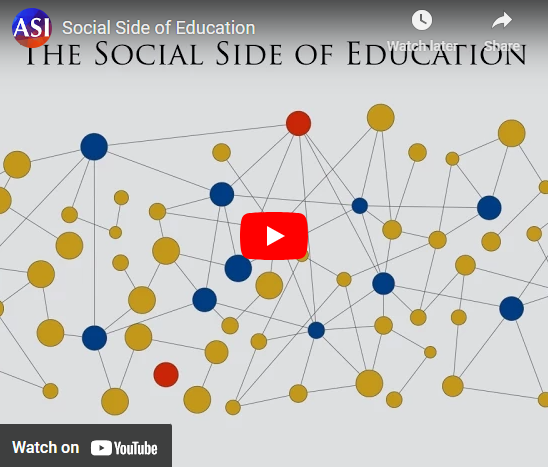
2015
Organizing the Workers of Walmart: From Bentonville to Beijing
With over 11,000 stores in 27 different countries and $485+ billion in annual revenue, Walmart is not simply the world’s largest corporation: it is a global economic behemoth that seeks to dominate the local economy wherever it does business. Speakers at this session discussed campaigns to organize the workers of Walmart, in the United States and in China.
2015
Evidence in the "Florida Formula" For Education Reform
This policy brief reviewed the high quality evidence on the education reforms enacted in Florida for use by policy makers and the public.
2015
Reclaiming the Promise of Public Education Conversation Series
This lively and informative conversation series continued during the 2015-2016 school year. All of the conversations were recorded and can be viewed here.
2016
The Social Side of Education: How Social Aspects of Schools & School Systems Shape Teaching & Learning
This major conference highlighted recent evidence showing that social aspects of schools and school systems deeply influence school improvement and discussed the practical implications of this evidence.
2016
Does Money Matter in Education, Second Edition
This updated report by Professor Bruce Baker presents a comprehensive review of the high-quality empirical evidence on whether and how money matters in education. This is the second edition of the report originally released in 2012.
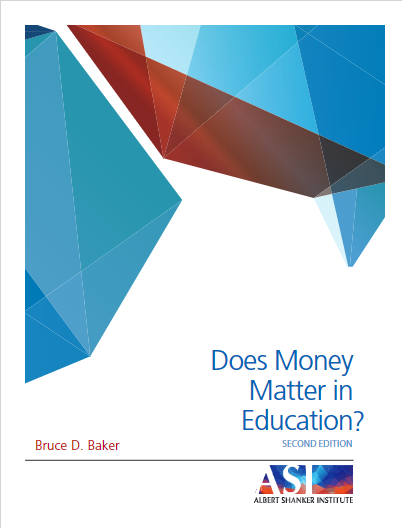
2016
The Challenge of Precarious Labor
This major conference brought together an international body of thinkers, analysts and activists to: explore the changes in the political economy that have led the increasing prevalence of precarious work; share experiences of organizing precarious labor; and discuss how to address the rise of precarious work through law and public policy.
2016
Deconstructing the Myth of American Public Schooling Inefficiency
In this report, authors Bruce Baker and Mark Weber put forth an accessible, evidence-based analysis of the difficulties inherent in comparing educational efficiency between nations.
2016
Competing Strands of Educational Reform Policy: Can Collaborative School Reform and Teacher Evaluation Reform Be Reconciled?
The purpose of this paper is to begin conceptualizing an avenue for reconciling policies of collaborative school reform and teacher evaluation reform.
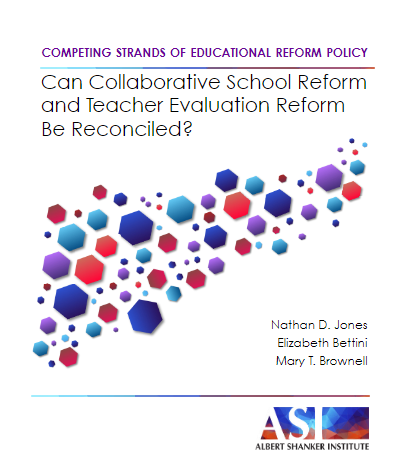
2016
International Refugee Crisis
Co-sponsored by the Albert Shanker Institute & the Jewish Labor Committee, distinguished speakers discussed the current international refugee crisis and draw historical parallels with the anti-refugee sentiments in the World War II era.
2016
Social Side of Education Reform: A Research Primer
This publication below pulls together six important research essays from the Social Side of Education blog series which shined a light on recent research suggesting that school improvement has a collective, social dimension that is often overlooked in education policy.
2016
Teacher Segregation in Los Angeles and New York City
This report presents a descriptive analysis of teacher segregation in the two largest districts in the U.S. - New York City and Los Angeles Unified.
2016
Reclaiming the Promise of Public Education Conversation Series 2016-2017
This lively and information conversation series continued during the 2016-2017 school year. Watch all the conversation videos here.
2017
Al Shanker Remembered on the 20th Anniversary of His Death: Special Blog Series
To mark the occasion of the 20th anniversary of the death of legendary president of the American Federation of Teachers, Al Shanker, the Institute published a series of posts from individuals who knew and worked with Al or studied his life’s work, to reflect on the continuing relevance of his ideas and his principles.
2017
The Role of School Organization, Social Capital and Collaboration in the Improvement of Teachers and Teaching. From Research Findings to Policy Proposals
At this convening, a diverse group of researchers, policy makers and practitioners explored whether and how social and organizational aspects of teachers’ workplaces influence their development and effectiveness.
2017
TEACHER STRIKE! Public Education and the Making of a New American Political Order Book Discussion
A wave of teacher strikes in the 1960s and 1970s roiled urban communities. In his book, Jon Shelton illuminates how this tumultuous era helped shatter the liberal-labor coalition and opened the door to the neoliberal challenge at the heart of urban education today.
2017
The Crisis of Democracy Conference
This major conference drew together intellectuals and activists from across the globe to examine and explore the political forces and dynamics at work during this time of organic crisis with an eye to identifying opportunities to strengthen democratic institutions and democratic practices.
2017
Public and Private School Segregation in the District of Columbia
This research brief describes and decomposes school segregation by race and ethnicity in the District of Columbia, with a particular focus on segregation within and between the public and private sectors.
2017
Elevating Relationships: How Collaboration Shapes Teaching and Learning
This article by Shanker Institute Senior Fellow, Esther Quintero, appeared in the Summer 2017 edition of American Educator.
2017
Democratizing Evidence in Education
This chapter, "Democratizing Evidence in Education” in Connecting Research and Practice for Educational Improvement (Routledge, Taylor & Frances Group, 2017), explores how to make the evidence movement more inclusive to ensure that education stakeholders can meaningfully participate in the production and use of research.
2017
Teaching in Context: The Social Side of Education Reform
Teaching in Context (Harvard Education Press, 2017), edited by Shanker Institute Senior Fellow Esther Quintero, provides new evidence from a range of leading scholars showing that teachers become more effective when they work in organizations that support them in comprehensive and coordinated ways.
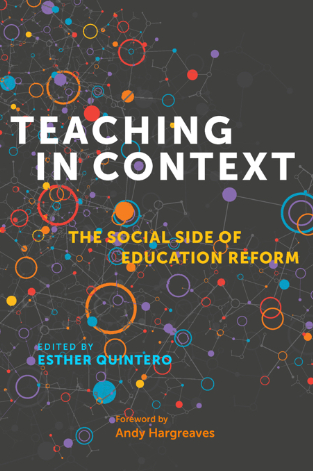
2017
Daniel Koretz Book Discussion: The Testing Charade: Pretending to Make Schools Better
In this discussion, Daniel Koretz, the nation’s foremost expert on educational testing, presents damning evidence for that charge, and builds a powerful case for why—and how—we have to fix it.
2017
Reclaiming the Promise of Public Education Conversation Series 2017-2018
This lively and information conversation series continued during the 2017-2018 school year. Watch all the conversation videos here.
2018
Puerto Rico: The Road to Recovery and Reconstruction
This major conference focused on what needed to be done to rebuild the Puerto Rican economy and its educational system in the wake of the devastation caused by Hurricane Maria.
2018
Israel-US Conversation You Haven't Heard Before
This conversation featured Israeli social justice activist and trade unionist Rami Hod who discussed how the citizens of the United States and Israel can work together to help build a broad movement for progressive change.
2018
Eugenia Kemble Research Grants
These seed grants, honor of the Institute's first Executive Director, will be awarded to young scholars who are doing promising work in our focus areas of education, labor and democracy and help them to develop their research into articles for publication in peer-reviewed academic journals.
2018
The Collection and Availability of Teacher Diversity Data: A Survey of 51 State Education Agencies
In late 2017, the Institute conducted a survey of state education agencies (SEAs) in 50 states and the District of Columbia and asked whether detailed teacher race and ethnicity data are collected, and whether and how they are made available to the public.
2018
Book Discussion: Striking to Survive: Workers Resistance to Factory Relocation in China
The authors of Striking to Survive discuss a recent wave of factory closures in China’s Pearl River Delta and struggles by workers there to hold onto their jobs, their pensions, and their livelihoods.
2018
Book Discussion with Stanley Litow: The Challenge for Business and Society From Risk to Reward
Author and Shanker Board Member Stanley Litow, discussed how big companies can be motivated to step up their efforts to create jobs, reduce poverty, improve education and health, and address climate change issues — both domestically and around the world.
2018
Reclaiming the Promise of Public Education Conversation Series 2018-2019
This lively and information conversation series continued during the 2018-2019 school year. Watch all the conversation videos here.
2019
The Adequacy and Fairness of School Finance System
In the inaugural report, the authors introduce an updated, public database of state school finance measures, and present results for three key measures in this system: effort, adequacy, and progressivity.
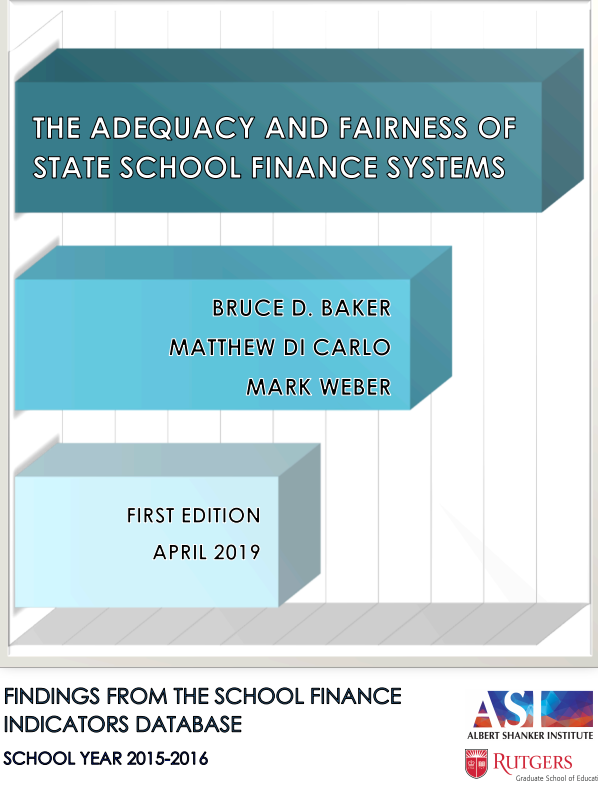
2019
Cutting Through the Clutter of School Finance
In the context of the new school finance report and public dataset, published this month by researchers from the Shanker Institute and Rutgers Graduate School of Education, this panel addressed how school finance data and research can be presented in an accessible and policy-relevant manner while preserving rigor and sophistication.
2019
The Future of American Labor: Initiatives for a New Era
This major conference, sponsored by the Albert Shanker Institute, The Century Foundation and the Harrison Institute for Public Law and co-sponsored by: The American Prospect, Dissent, Kalmanovitz Initiative for Labor and the Working Poor Georgetown University, Center for Innovation in Worker Organization in the Rutgers School of Management and Labor Relations, featured union activists and leaders, labor scholars and elected officials who discussed the strategic lessons of the ‘Teacher Insurgency,’ the post-Janus work of public sector unions, the potential of sectoral bargaining, organizing among millennials and federal government legislative and policy initiatives on behalf of labor organizing.
2019
School Finance and Teacher Pay Competitiveness
This research brief presents state-by-state estimates of the gaps in wages between teachers and comparable non-teacher professionals, with particular focus on the relationship between these “teaching penalties” and state school finance systems. (All estimates are from the School Finance Indicators Database.)
2019
Leading While Muslim Book Discussion
This book examines the lived experiences of American Muslim principals who serve in public schools post-9/11 to determine whether global events, political discourse, and the media coverage of Islam and Muslims have affected their leadership and spirituality.
2019
School Segregation by Race and Class in the D.C. Metro Area
This research brief describes and decomposes school segregation by race and ethnicity in the Washington, D.C., metropolitan area, including: the District of Columbia; Alexandria, Arlington, and Fairfax County in Virginia; and Montgomery County and Prince George’s County in Maryland.
2019
In Defense of American Democracy
This all-day event, held at George Washington University in Washington, D.C., was organized by the Albert Shanker Institute, the American Federation of Teachers, and Onward Together, the organization founded and led by Hillary Clinton. The conference drew together intellectuals and activists who examined and explored different dimensions of the current crisis of American Democracy, with a particular focus on Civic Engagement and Voter Rights and Voter Suppression.
2019
Reclaiming the Promise of Public Education Conversation Series 2019-2020
This lively and informative conversation series focusing on important educational issues, continued monthly during the 2019-2029 school year.
2020
The Adequacy and Fairness of School Finance Systems (Second Edition)
This second edition of our annual finance report presents measures of the effort, adequacy, and fairness of each state's school finance system, using a public database compiled by researchers at ASI and Rutgers Graduate School of Education.
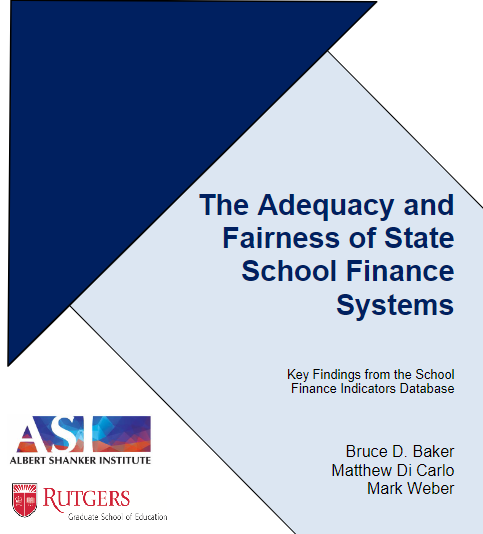
2020
"Slaying Goliath" Book Discussion with Diane Ravitch and Randi Weingarten
In “Slaying Goliath: The Passionate Resistance to Privatization and the Fight to Save America's Public Schools," Diane Ravitch, one of the foremost authorities on education and the history of education in the United States examines the ways in which parents, teachers, activists--citizens--are successfully fighting back to defeat the forces that are privatizing America's public schools.
2020
The Coronavirus Pandemic and K-12 Education Funding
This report examines the implications of the coronavirus pandemic for K-12 education funding, and lays out state and federal policy recommendations to minimize the harm to school budgets.
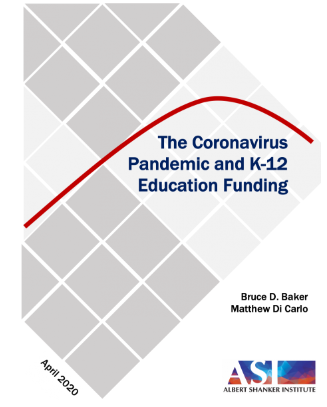
2020
Panel on The Coronavirus Pandemic and K-12 Education Funding
Bruce D. Baker and Matthew Di Carlo, the new report's principle authors, discussed the report’s recommendations and then a distinguished panel of experts: Sylvia Allegretto, Pedro Noguera, Joshua Starr, and Randi Weingarten, offered their responses and analyses. Watch the video of the session.
2020
Teaching and Learning During a Pandemic Blog Series
This blog series seeks to create a respectful, caring and intellectually stimulating space for our readers to reflect on how the Coronavirus pandemic is shaping the face of education.
2020
A New Deal: The Coronavirus Pandemic and Rebuilding Higher Education
In this policy brief, four prominent scholars examine how public colleges and universities, after decades of underfunding, can cope with projected budget shortfalls brought on by the pandemic.
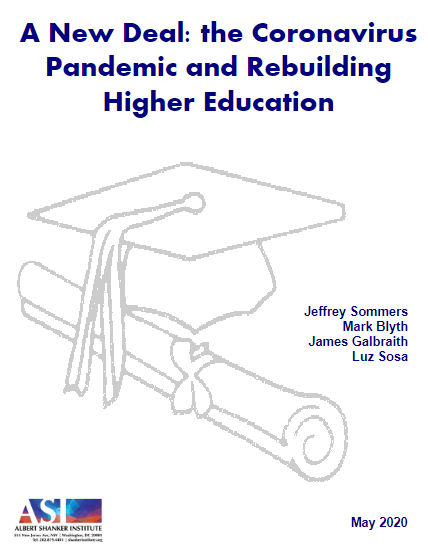
2020
Higher Education Funding: The Impact of the Coronavirus
In this webinar co-sponsored by the Shanker Institute, the American Federation of Teachers and American Association of University Professors, the authors of the Institute's policy brief and other distinguished panelists, discussed the impact of the coronavirus pandemic on higher education funding, possible alternatives to austerity, and strategies to see them achieved. Watch the webinar.
2020
Safely Reopening America's Schools
A distinguished panel of experts explored the challenge of how schools can be reopened in ways that protect the health and safety of students, teachers and other adult staff with the current state of our knowledge on best practices and sound policies, and provided guidance to educators and policymakers on how to move forward under harrowing circumstances. Watch the panel.
2020
Saving Our Democracy
A distinguished panel discussed what is at stake for American democracy in the 2020 election. Former U.S. Attorney General Eric H. Holder Jr. explained how gerrymandering and voter ID laws have overwhelmingly affected people of color and people with lower incomes. Harvard professors Steven Levitsky and Daniel Ziblatt examined how extreme polarization—stemming from the two main political parties diverging on racial and cultural identity—is tearing our country apart. Suzanne Nossel, the chief executive officer of PEN America, talked about ways to speak, listen and protest without silencing others. AFT President Randi Weingarten moderated the discussion. Watch the panel. Read the special issue of the AFT’s American Educator magazine.
2020
Discussion of "Moving: A Memoir of Education and Social Mobility" with Andy Hargreaves
This virtual book discussion of "Moving: A Memoir of Education and Social Mobility" with author Andy Hargreaves and Randi Weingarten, explored social mobility—the chance, through education, to achieve greater success than one’s parents. Beginning in 1950s northern England, this memoir links Andy Hargreaves’s experiences of social mobility to today’s challenges of inequity and immobility. Watch the video of the panel.
2020
Where Teachers Thrive: Organizing Schools for Success Book Discussion with Susan Moore Johnson
In Where Teachers Thrive Dr. Susan Moore Johnson presents a powerful argument about the importance of the school as an organization in effective teaching and learning and explains why some schools she studied failed and others succeeded. In this discussion Johnson explores the implications of her work for principals, teachers, and policymakers as they confront the challenges of education in a Covid-19 world. This conversation was facilitated by Dr. Shimon Waronker, Principal of Yeshiva - Beth Rivkah Colleges, Melbourne Australia. Watch the discussion.
2020
Democracy Declaration
This print "ad" which appeared in the New York Times endorsing democracy was signed by thousands of America's leading educators.
2020
The Teacher Insurgency: A Discussion with Author Leo Casey and Randi Weingarten
In The Teacher Insurgency: A Strategic and Organizing Perspective, Shanker Institute Executive Director Leo Casey addresses how the unexpected wave of recent teacher strikes has had a dramatic impact on American public education, teacher unions, and the larger labor movement. In this panel, Leo Casey and Shanker Institute and AFT President Randi Weingarten explore how this uprising was not only born out of opposition to government policies that underfunded public schools and de-professionalized teaching, but was also rooted in deep-seated changes in the economic climate, social movements, and, most importantly, educational politics. Watch the video.
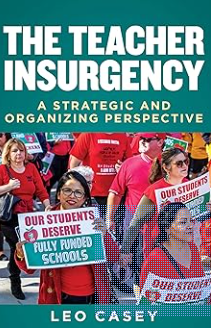
2020
In Solidarity With Those Who Share Our Purpose: The United Federation of Teachers and the Civil Rights Movement, 1963-1965
Authored by AFT member and Shanker Civics Fellow, Stephen Lazar, this paper examines the United Federation of Teachers involvement with the Civil Rights Movement between 1963 and 1965.
2021
The Adequacy and Fairness of State School Finance Systems (Third Edition)
This third edition of our database and annual report is being published in the middle of a terrible global crisis: the coronavirus pandemic. Due to the lag in the release of national school finance data, our measures (2017-18 school year) predate the economic crisis caused by this pandemic.
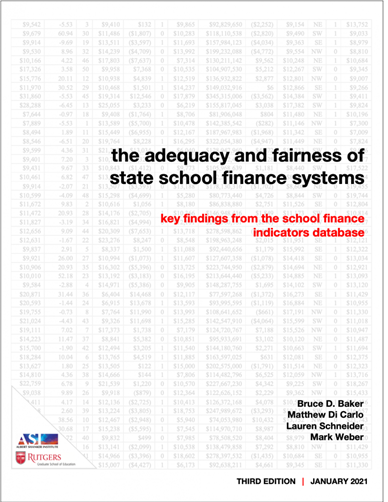
2021
Strike for the Common Good Book Discussion
Strike for the Common Good: Fighting for the Future of Public Education editor Becky Kolins Givan and Shanker Board Member Professor Joseph McCartin, discussed the wave of nationwide strikes by students and parents who have supported them, and by outside analysts (academic and otherwise), and explored the place of these strikes in the broader landscape of recent labor organizing and battles over public education. Watch the discussion.
2021
A Wolf at the Schoolhouse Door Book Discussion
In this discussion, education historian Jack Schneider and journalist Jennifer Berkshire, co-hosts of the popular education podcast Have You Heard and authors of A Wolf at the Schoolhouse Door, trace the war on public education to its origins, offering the deep backstory necessary to understand the threat presently posed to America’s schools. The panel also featured discussant Andy Smarick. Watch the video.
2021
Public and Private School Segregation in New York City
This report presents findings from a descriptive analysis of segregation by race and ethnicity in all NYC schools in the 2017-18 school year, with a particular focus on comparing the public and private sectors.
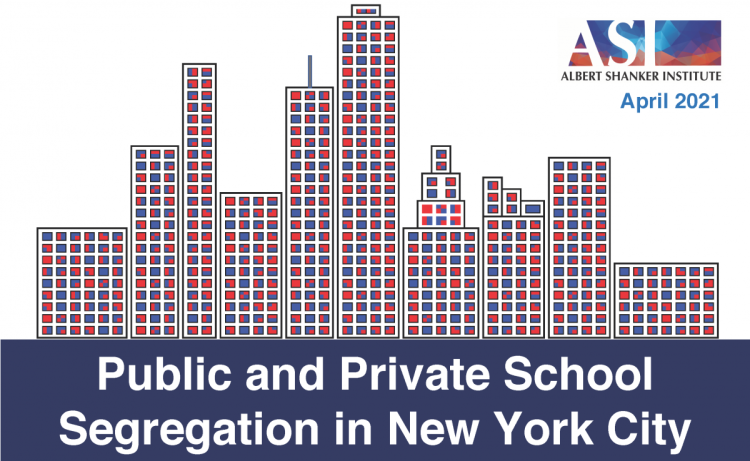
2021
"Mutualism" Book Discussion with Sara Horowitz and Randi Weingarten
Author and Shanker Board Member Sara Horowitz and AFT and ASI President Randi Weingarten discussed Mutualism: Building the Next Economy From the Ground Up, which explores new ways to build collaboratively, create the new American social contract, and prosper in the twenty-first century. Watch the discussion.
2021
Adequacy of School Distric Spending in the U.S.
This research brief presents key findings from a new public database of funding adequacy for over 12,000 U.S. public school districts. The database (the District Cost Database) allows comparison of each district’s actual per-pupil spending with estimates of adequate per-pupil spending levels. The data are for the 2017-18 school year.
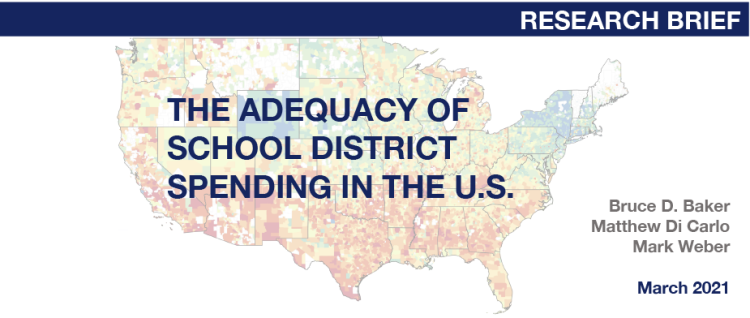
2021
"Breaking Barriers" A Conversation with Stan Litow and Randi Weingarten
Author and Shanker Board Member Stan Litow and AFT and ASI President Randi Weingarten discussed Breaking Barriers, which explores the P TECH school reform effort, providing a clear pathway from school to college to career. September 2021 was the10th anniversary of the opening of the first P TECH school in Brooklyn, and there are now over 250 schools across a dozen states and 28 countries around the world. Watch the video.
2021
Re-Union Book Discussion about Sectoral Bargaining
In this panel, David Madland, author, RE-UNION: How Bold Labor Reforms Can Repair, Revitalize and Reunite the United States, Larry Cohen, former president, Communication Workers of America and Shanker Board Member; Lynn Rhinehart, senior fellow, Economic Policy Institute; and César F. Rosado Marzán, professor,University of Iowa College of Law, explore Madland's argument that a new labor system based on enhanced rights for workers, incentives for union membership, and greater sectoral bargaining to complement worksite-level bargaining is critical to revitalizing labor and addressing America’s core economic and political challenges. Watch the panel.
2021
Constitution Day 2021 Blog Series
September 17 is designated as Constitution Day and Citizenship Day to commemorate the signing of the U.S. Constitution in Philadelphia on September 17, 1787. As the Constitution is our nation’s premier founding document, the Albert Shanker Institute created a blog series this year to recognize Constitution Day through the question, “Why is it important to teach the Constitution?”
2021
Literacy Blog Series
The Institute is renewing its commitment to literacy and expanding its focus to include: effective reading strategies beyond early childhood; a systemic/organizational approach to reading instruction; and perspectives, especially established or emerging science that is culturally specific. As part of this new initiative, our ongoing Literacy Blog Series focuses on literacy instruction from pre-k through adulthood.
2021
American Teacher Union History
This new section of the Shanker Institute website is focused on the history of American teacher unionism. It has grown out of the mission of the Institute, with its focus on the themes of public education, unionism and democracy, and the life’s work of our namesake, the late American Federation of Teachers President Al Shanker. Since the Institute is affiliated with the AFT, this section tells the story of our own history.
2021
Why Voting Rights Matter for People With Disabilities
One in four people in the United States have a disability, yet they are underserved and face enormous challenges in exercising their right to vote, from polling place accessibility issues to guardianship laws, and more. At the same time, states are increasingly restricting access to voting for all Americans. In this all-star panel sponsored by the Shanker Institute and the Century Foundation, U.S. Senator Tammy Duckworth and a distinguished group of experts discussed the threat to voting rights, why it is critical to protect them, especially for people with disabilities, and what Congress is considering doing to protect voting rights for all Americans. Watch the video and read the accompanying blog series.
2021
The Adequacy and Fairness of State School Finance Systems (Fourth Edition)
This report is a joint project of researchers at ASI and the Rutgers Graduate School of Education. Visit the report's homepage to read the report and access other resources, including one-page profiles of each state's school finance system, online data visualizations, and more.
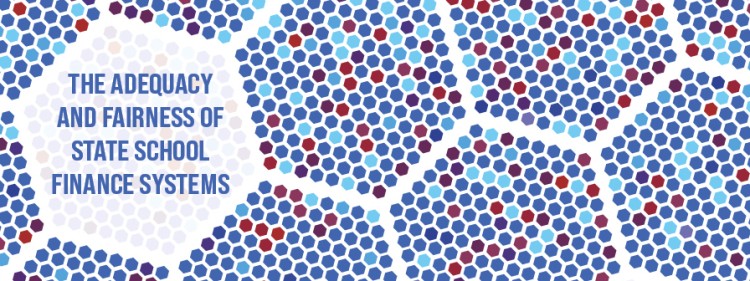
2022
Countering Misinformation in the Classroom: A Media Literacy Discussion with Randi Weingarten and Newsguard
In this Q & A style session, AFT President Randi Weingarten and Steven Brill, veteran journalist and co-founder of NewsGuard, discussed the misinformation trends NewsGuard’s analysts are encountering in the field, and the tactics educators can employ in their classrooms to counter these trends. Watch the video.
2022
Literacy Systems Matter: An Infrastructure Approach to Reading Achievement
This panel unpacks the pillars of this reading infrastructure –-resources for professional development, the alignment of available tools, principals’ communication about a reading curriculum, and teachers’ working conditions for collaborating to learn about different forms of reading instruction – reflecting on how a lack of attention to them can hamper science-based reading interventions. Panelists emphasized the need to move away from blaming (or praising) the individual teacher and offer recommendations to create the conditions that support effective reading interventions leading to successful, lasting outcomes. Watch the panel.
2022
Working for the Common Good at the Bargaining Table and Beyond
From Broadband for All to The Schools Our Students Deserve, both private and public sector unions and community allies have focused their power on advancing an agenda focused on the common good that goes beyond traditional wages, benefits, and working conditions. This conference which included the participation of several major union presidents, looked at the role of unions as they continue to push the boundaries of their traditional roles pursuing common cause with their communities and developing additional avenues for victories for all as well as the opportunities to expand these efforts for the common good at the bargaining table and in all other arenas as well. Watch the video.
2022
Segregation and School Funding: How Housing Discrimination Reproduces Unequal Opportunity
The important study examined the impact of segregation for race- and ethnicity-based school funding disparities in the United States on unequal educational opportunity.

2022
Educating for Democratic Citizenship Conference
The Albert Shanker Institute in partnership with Cornell University’s Institute of Politics and Global Affairs, held a virtual conference which featured a plenary on Teaching Voting Rights, several prominent speakers, such as Congresswoman Rosa DeLauro (D-CT), former Congressmen Steve Israel (D-NY) and Christopher Shays (R-CT), and showcased the Shanker Institute fellows, a group of accomplished, experienced educators, who have developed Action Civics” lessons and materials that we hope will improve teaching and learning of American History, Government, and Civics for teachers and students.
2022
A New Presidency in the Philippines, the Continued Fight for Democracy and Labor's Work
This panel, moderated by former USAID administrator and Senior Fellow at Brown University and former dean of the Humphrey School of Public Affairs at the University of Minnesota Brian Atwood, and featuring AFT president and ASI president, Randi Weingarten, and Philippine labor leader Annie Enriquez Geron, discussed the work being done by their unions in the U.S. and the Philippines and what unites their efforts to strengthen their respective country’s democracies amidst continued assaults. Jessica Tang, ASI Board member, Boston Teachers Union president, and co-chair of the AFT’s AAPI Task Force provided opening comments and context. Watch the video.
2022
A New Federal Formula
In this report, we propose and simulate a framework for a new foundation formula approach to distributing federal K-12 education aid. This proposal, with full funding and compliance, would provide every school district with the estimated revenues necessary to reach the goal of average national outcomes in math and reading. The framework is designed to target assistance where it is most needed by allocating federal funds based not only on student need, but also on states’ and school districts’ ability (and willingness) to contribute themselves, given their capacity to raise revenue—ie on their “effort.” Read the report.

2022
Constitution Day 2022 Blog Series and Resources
September 17 is designated as Constitution Day and Citizenship Day to commemorate the signing of the U.S. Constitution in Philadelphia on September 17, 1787. In 2022 with so much at stake, the Shanker Institute published its Constitution Day 2022 Blog Series.
2022
A More United America: Teaching Democratic Principles and Protected Freedoms
This six-part webinar series, A More United America: Teaching Democratic Principles and Protected Freedoms has something for everyone, whether you teach history, civics, math or science, or are a parent or guardian. It is the responsibility of all of us to understand our rights as citizens and residents of the United States, and that starts with understanding the Constitution. Watch the on-demand sessions which are available for PD credit.
2022
Educating for Democratic Citizenship Lesson Plans
Educating for Democratic Citizenship features "Action Civics" lessons and related materials developed by a group of accomplished, experienced educators which we hope will improve teaching and learning of American History, Government, and Civics for teachers and students. This Action Civics approach supports students’ learning about the political process as they identify, research, and take informed action on issues that are important to them. These meaningful learning experiences help young people gain knowledge, develop skills, and grow their motivation for lifelong civic participation. These lessons can be found on a dedicated section of ShareMyLesson.
2022
AFT in Solidarity with Ukraine
This panel with Dr. Irwin Redlener, pediatrician with the Ukraine Children’s Action Project. and Randi Weingarten, President, American Federation of Teachers and Albert Shanker Institute discussed the situation in Ukraine. In the midst of unthinkable brutality, there was hope and inspiration in the resilience and unwavering determination of the educators to create some sense of normalcy for themselves and their students in the face of this terror. THe panel also featured Alexandra Hernandez, Bilingual Special Education Teacher, United Federation of Teachers, New York City. Watch the video.
2023
Supreme Court: From Guardian of Rights to Extremist Majority with Senator Sheldon Whitehouse and Randi Weingarten
Senator Sheldon Whitehouse, AFT President Randi Weingarten and a distinguished panel discussed recent Supreme Court decisions and their impact on abridging Americans’ basic freedoms and what we can do. Watch the video.
2023
The Intersection of Democracy and Public Education
Co-sponsored by the Albert Shanker Education International, this distinguished international panel discussed how to strengthen public education and democracy. The panel featured Randi Weingarten, President, American Federation of Teachers and Shanker Institute; Susan Hopgood, President, Education International; Mugwena Maluleke, General Secretary, South African Democratic Teachers Union (SADTU); Manuela Mendonça , President, National Board of the National Federation of Teachers (FENPROF), Portugal; Olha Chabanuik, Vice-president, Trade Union of Education and Science Workers of Ukraine (TUESWU); and Kateryna Maliuta-Osaulova, Director, International Department, Trade Union of Education and Science Workers of Ukraine (TUESWU). Watch the panel.
2023
Reading Reform Across America: A Survery of State Legislation
Reading Reform Across America examines reading-related legislation enacted between 2019 and 2022, analyzing a total of 223 bills enacted in 45 states and the District of Columbia through examination of over 40 features, such as teacher preparation, professional development, and curriculum, to name a few. Read the report.

2023
The Source Code: Revenue Composition and the Adequacy, Equity and Stability of K-12 School Spending
This report offers a national analysis of the relationship between K-12 revenue composition—that is, the percentage of funding that comes from state versus local sources—and the adequacy, equity, and stability of school spending. Read the report.

2023
The Source Code: Revenue Composition and the Adequacy, Equity, and Stability of K-12 School Spending Data Visualization Tool
This data visualization tool allows users to display each state's K-12 school revenue "portfolio" between 1998 and 2020, and to compare it with that in other states. The tool accompanies this report.
2023
Literacy Blog Series
The Institute continued publishing a number of new blogs in its Literacy Blog Series which focus on literacy instruction from pre-k through adulthood.
2023
Brown v Board of Education of Topeka Blog Post Series
In honor of the 69th anniversary of the Supreme Court Brown v. Board of Education of Topeka decision, the Institute published a series of blog posts commemorating the event.
